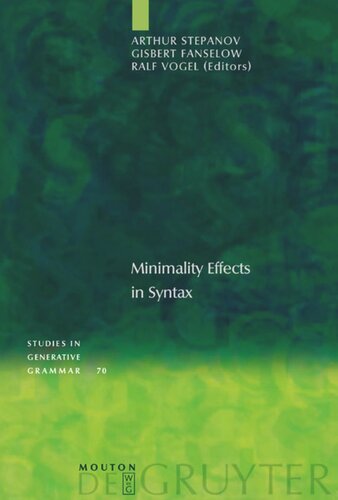

Most ebook files are in PDF format, so you can easily read them using various software such as Foxit Reader or directly on the Google Chrome browser.
Some ebook files are released by publishers in other formats such as .awz, .mobi, .epub, .fb2, etc. You may need to install specific software to read these formats on mobile/PC, such as Calibre.
Please read the tutorial at this link: https://ebookbell.com/faq
We offer FREE conversion to the popular formats you request; however, this may take some time. Therefore, right after payment, please email us, and we will try to provide the service as quickly as possible.
For some exceptional file formats or broken links (if any), please refrain from opening any disputes. Instead, email us first, and we will try to assist within a maximum of 6 hours.
EbookBell Team

0.0
0 reviewsThe volume is a collection of 12 papers which focus on empirical and theoretical issues associated with syntactic phenomena falling under the rubric of Relativized Minimality (Rizzi 1990) or, in more recent terms, Minimal Link Condition (MLC, Chomsky 1995). The bulk of the papers are based on the ideas presented at the Workshop "Minimal Link Effects in Minimalist and Optimality Theoretic Syntax" which took place at the University of Potsdam on March 21-22, 2002.
All contributors are prominent specialists in the topic of syntactic Minimality. The empirical phenomena brought to bear on Minimality/MLC in the present volume include, but not limited to:
Nine of the proposed accounts are couched in the Minimalist framework (Chomsky 1995, 2000, 2001), three in the framework of Optimality Theory (Prince and Smolensky 1993). Thematically, the contributions divide into three groups addressing the following major questions:
How can apparent violations of syntactic Minimality/MLC be accounted for? (Haida, Stepanov, Poole, Fisher, Anagnostopoulou)
What is the status of MLC? Is it a primitive or a theorem in the grammar? (Müller, Fanselow, Lechner, Vogel, Lee, Haider)
Can Minimality phenomena shed decisive evidence in favor of a derivational (Minimalist type) or a representational (Optimality theory like) framework? (Hale and Legendre, Haider)